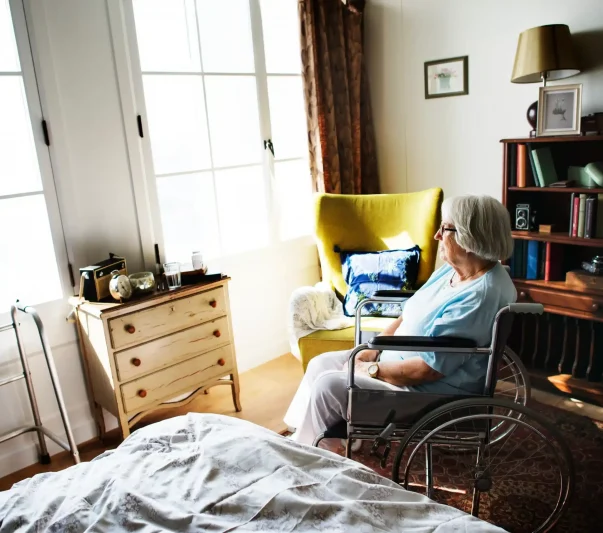Our older friends, neighbors, and family members are some of the most vulnerable members of our community. While their loved ones will go to great lengths to protect them, elder abuse can be a serious and often hidden problem in New Mexico. Worse, it’s often committed or allowed by those we trust to care for them.
This page will offer clear guidance on how to identify, document, and report elder abuse in New Mexico. If you suspect your loved one is experiencing elder abuse, the trusted legal team at Olson Personal Injury Lawyers is here to help. Contact us online or call (505) 391-8978 today for a free consultation.
Steps To Follow When Reporting Elder Abuse in New Mexico
When you suspect elder abuse in New Mexico, following this series of practical steps can help you understand where to report the case, what information you’ll need, and how to put it all together:
- Identify the primary reporting agency: The government entity investigating your case will depend on your loved one’s living situation. The New Mexico Health Care Authority’s Division of Health Improvement (DHI) handles abuse, neglect, or exploitation in licensed health care facilities, while the New Mexico Aging and Long-Term Services Department and its Adult Protective Services Division (APS) handle general elder abuse.
- Gather necessary information: Investigators will need to know the victim’s name and location, as well as any details you have of the suspected abuse, including information on the potential abuser. Make sure to include contact information so the agency can stay in touch with you.
- Submit the report: New Mexico APS runs a statewide Adult Abuse, Neglect, and Exploitation Hotline at (866) 654-3219. You can also file a form online. For elder abuse in health care facilities, you can call the Health Facility Complaints Hotline at (800) 752-8649 or send a completed complaint form to the DHI by mail, email, or fax at (888) 576-0012.
- Be prepared to follow up: Reports are confidential but not anonymous—investigators need your contact information to follow up or share findings. Your identity won’t be disclosed without your consent or a court order. You may file a facility complaint form anonymously, but the Health Care Authority cannot follow up unless you provide your identity.
- Learn how to report in an emergency: If you believe an elder abuse victim is in immediate danger, call 911 or local law enforcement immediately. Quick intervention could save the victim’s life.
Who Should Report Elder Abuse in New Mexico
Most states designate a few key professions, like health care workers, as “mandatory reporters,” meaning they are legally obligated to report any suspected abuse. However, in New Mexico, everyone is considered a mandatory reporter for elder abuse.
Anyone who becomes aware of suspected elder abuse, including family members, friends, neighbors, or even concerned strangers, has a legal duty to report it to the authorities. Reporting suspected abuse is critical to protecting vulnerable older adults from violence, neglect, and financial exploitation.
What Happens After You Report Elder Abuse in New Mexico
When you submit an elder abuse complaint, New Mexico authorities will begin a thorough process to evaluate the case and ensure the victim is safe and treated properly. Key steps of the investigation process include:
- Initial Review: APS will evaluate the complaint to determine if the case merits further investigation.
- Investigation: If APS finds the report is valid, it will initiate an investigation. The first steps may include visiting the alleged victim’s residence, interviewing those who might know about the abuse, and setting a time frame for the remainder of the process.
- Assessment of Safety and Needs: The investigators will work to “substantiate” or disprove each claim in the report while reviewing whether the victim’s needs are being met. If they find the victim needs immediate help, they can conduct an emergency removal and intervene on the victim’s behalf in court.
- Development of a Service Plan: The department may also create a “service plan” to provide short-term benefits to the victim, including help with medical care, legal representation, or housing.
- Potential for Law Enforcement Involvement: APS keeps the identities of the reporter, victim, and interviewees confidential unless those details are key to further legal proceedings. If investigators suspect criminal activity, the department will coordinate with law enforcement and the courts to ensure justice is served.
- Following Up with Involved Parties: The investigators may reach out to the reporter to notify them of the investigation results, but they aren’t legally required to do so. However, APS must notify the alleged abuser of the results and give them the opportunity to appeal the findings if the department determines that the abuse did occur.
How to Recognize Signs of Elder Abuse
Identifying key warning signs is critical to stopping elder abuse early, as it often involves plausible deniability and can be hard to prove. Some examples include:
- Unexplained bruises, welts, cuts, burns, or other injuries
- Sudden changes in behavior, such as social withdrawal, fear, or agitation
- Expressions of fear or anxiety, especially around certain individuals
- Poor hygiene and dirty or damaged clothing
- Signs of malnourishment
- Unsafe, unsanitary, or hazardous living conditions
- Sudden unpaid bills, unexplained transactions, or other unusual financial activity
- Unexpected changes to wills, trusts, or property titles
- Depression, anxiety, or social isolation
How Olson Personal Injury Lawyers Support Elder Abuse Victims
While New Mexico’s state agencies can help regulate abuse and hold perpetrators accountable, elder abuse victims must pursue civil litigation to secure a financial recovery for their pain and suffering, medical expenses, stolen assets, and other losses. The experienced legal team at Olson Personal Injury Lawyers can help you file a lawsuit on your loved one’s behalf and get the justice and compensation they deserve.
We’ll have your back throughout the process because your case is personal to us. We pride ourselves on our commitment to unwavering services, unrivaled representation, and outstanding results. Call us today at (505) 391-8978 to schedule your free case evaluation.






